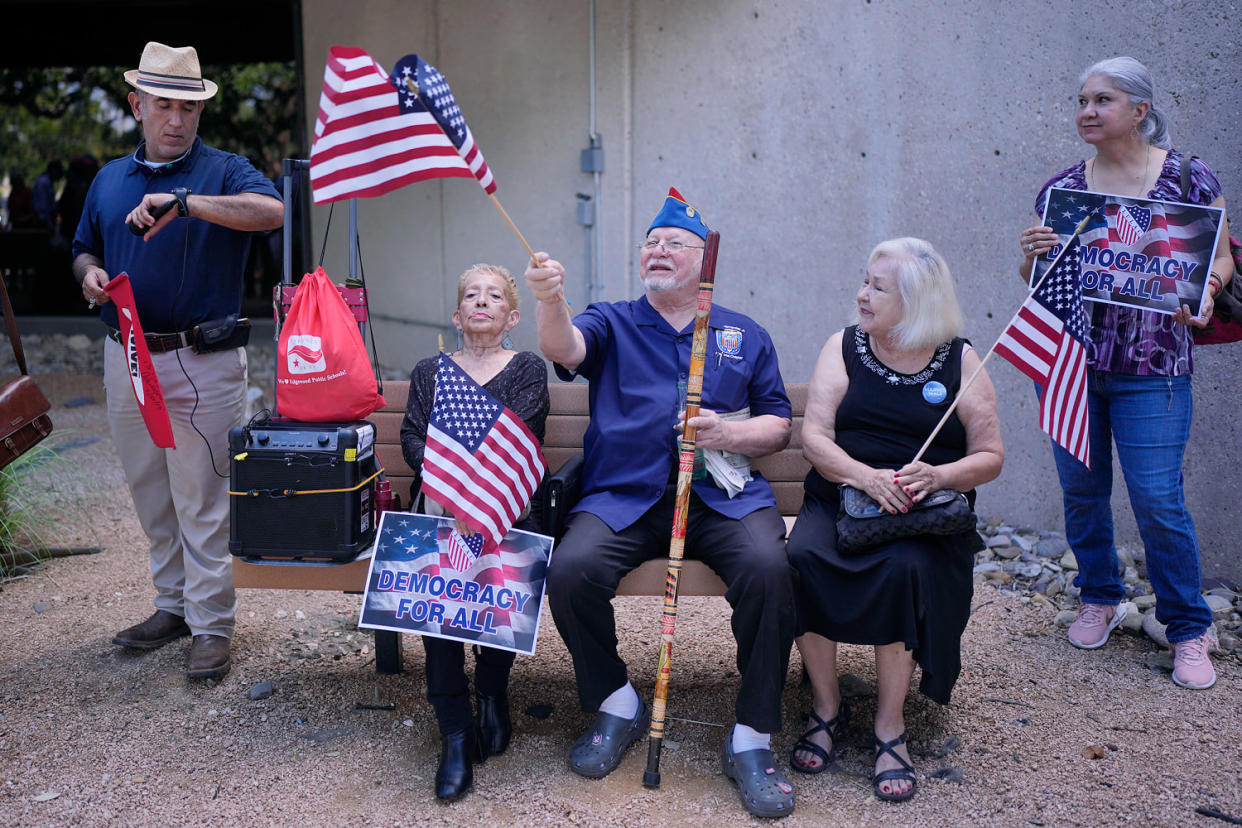Latino group, LULAC, steps up voter registration after Texas attorney general's raids

SAN ANTONIO — In the three weeks since Texas’ attorney general executed raids at the homes of several Latino election activists, the state’s oldest civil rights organization has been marshaling members to step up voter registration for what they say is a stand against voter suppression.
Local chapters of the League of United Latin American Citizens, LULAC, have been calling on volunteers to get certified so they can register Texas Latinos and other voters. Next week, LULAC’s national office plans to launch a get-out-the-vote drive, leveraging its 535 local councils in 33 states.
“Our members have gone from shock to anger to resolve and are doubling their commitment to register voters and get them to polls,” LULAC CEO Juan Proa?o told NBC News.
Paxton ordered the raids with armed officers on Aug. 20 in what his office and a South Texas district attorney’s office have said is an ongoing investigation of vote fraud through illegal collection and handling of applications for mail ballots and the ballots themselves.
No charges have been filed and no indictments have been issued in the two-year-old investigation, which began when a Democrat in Frio County complained to the county's district attorney about “ballot harvesting” after she lost her 2022 primary, according to an affidavit for a search warrant signed in March.

A hearing was held Thursday on whether investigators are entitled to look through all the documents and electronic devices seized in a raid on the home of Juan Manuel Medina, a LULAC member and chairman of the Tejano Democrats. Medina’s attorney argued that the computers, phones and other digital devices contain privileged information unrelated to the investigation.
Medina’s attorney Gerald Goldstein said at the hearing that officers who showed up at Medina’s home in the early morning “broke the front door,” adding: “There was glass everywhere. Their guns were drawn.” Medina’s young daughters were there, and the family was forced to step outside, walking through the glass while the seven-hour search took place. Medina would not comment on advice from his attorney.
A contingent of LULAC members and other Hispanic activists attended the hearing in support of Medina.
The raids have left trauma and fear among those targeted and activists who have been working locally to register and turn out voters for this election, as they have in previous elections.
Longtime LULAC member Lidia Martinez, 87, whose home was searched by nine officers who arrived while she was in her nightgown, said Thursday that she has stopped all election activities on the advice of an attorney and at her family’s request. Officers also seized her state certificate showing she had taken the training required annually to be deputized to register voters and turn in their registrations.
Martinez has been a liaison to seniors for LULAC, but she has also arranged social events for area seniors, including a Valentine’s Day gathering. She had been working on a fundraiser for the GI Forum, another Latino civil rights organization formed to assist veterans, and another social event when her home was raided.
The officers took her phone, and though she has replaced it, she said, the seniors she assisted and brought together can’t contact her because they don’t have her new phone number.
“It’s like I’m not in America,” Martinez said outside the hearing.
Texas LULAC President Gabriel Rosales said in a phone interview that along with the fear, the raids “kind of lit a fire from Hispanics around Texas. We are hearing from all over.”
“No hay mal que por bien no venga,” Rosales said, repeating a phrase that his mother told him that he said is similar to saying, “When a door closes, a window opens.”
Roman Pe?a, 86, a commander of the American GI Forum, a historic Latino and veterans civil rights group formed in Texas, said he will step in to do the work Martinez can no longer do. He said he has been doing voter registration for years.
Members of LULAC's local councils in San Antonio and Houston said they planned voter registration drives this weekend.
For its national campaign being launched next week, LULAC plans to provide all its local councils with know-your-rights information and resources to help people register, find polling places and ensure their voter registrations are active. The launch aligns with National Voter Registration Day, which is Tuesday, Proa?o said.
The group had begun working on a national voter drive before the raids, but they served to heighten the group’s attention on it and intention, he said.
“Councils have been doubling their efforts to engage Latino voters across Texas and across the country,” Proa?o said. “Our oldest members are so angry about what is happening to Lidia [Martinez], they are going out to do this.”
LULAC was founded in 1929 in Texas by Mexican Americans in Texas, many of them middle- and upper-class citizens and veterans of World War I. The group has challenged discrimination, inequity in education, voter suppression and racism against Latinos. Its founders sought to emphasize that its members and many people of Mexican descent in Texas and other parts of the country should be seen and treated as Americans.
For more from NBC Latino, sign up for our weekly newsletter.
This article was originally published on NBCNews.com
